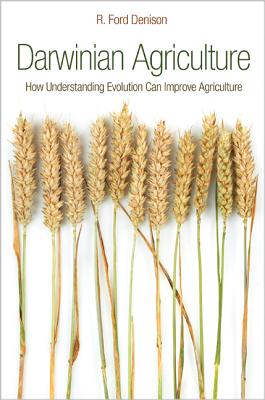

 Princeton University Press
Princeton University Press
Darwinian Agriculture: How Understanding Evolution Can Improve Agriculture


Key Metrics
- R Ford Denison
- Princeton University Press
- Paperback
- 9780691173764
- 9.21 X 6.14 X 0.61 inches
- 0.92 pounds
- Technology & Engineering > Agriculture - Sustainable Agriculture
- English
 Secure Transaction
Secure TransactionBook Description
As human populations grow and resources are depleted, agriculture will need to use land, water, and other resources more efficiently and without sacrificing long-term sustainability. Darwinian Agriculture presents an entirely new approach to these challenges, one that draws on the principles of evolution and natural selection.
R. Ford Denison shows how both biotechnology and traditional plant breeding can use Darwinian insights to identify promising routes for crop genetic improvement and avoid costly dead ends. Denison explains why plant traits that have been genetically optimized by individual selection--such as photosynthesis and drought tolerance--are bad candidates for genetic improvement. Traits like plant height and leaf angle, which determine the collective performance of plant communities, offer more room for improvement. Agriculturalists can also benefit from more sophisticated comparisons among natural communities and from the study of wild species in the landscapes where they evolved.
Darwinian Agriculture reveals why it is sometimes better to slow or even reverse evolutionary trends when they are inconsistent with our present goals, and how we can glean new ideas from natural selection's marvelous innovations in wild species.
Author Bio
R Ford Denison is Adjunct Professor at the College of Biological Sciences, University of Minnesota and focuses his teachings and research in the areas of ecology, evolution and behavior.
From 1993 through 2002, R. FORD DENISON taught crop ecology and conducted research at the University of California, Davis, on topics ranging from agricultural sustainability to the evolution of cooperation between microbes and plants.
For most of this time, he directed "the world's youngest 100-year experiment" (LTRAS.ucdavis.edu), tracking the long-term trends that determine agricultural sustainability. His work on symbiotic nitrogen fixation, a possible alternative to nitrogen fertilizers, has led to a patent and publications in journals from Nature to Field Crops Research.
One recent paper, "Darwinian Agriculture: When Can Humans Find Solutions Beyond the Reach of Natural Selection?" points out some limitations both of agricultural biotechnology and of agriculture that mimics natural ecosystems. He has been interviewed on National Public Radio, Science Update (AAAS), and DeutschlandRadio and has been an invited speaker at international meetings and at institutions from Japan's National Agricultural Research Center to the Scripps Institute of Oceanography.
He was educated at Harvard, Evergreen, and Cornell, where he earned a Ph.D. in Crop Science, with postdoctoral and sabbatical research at UC Davis, UCLA, Queen's University (Ontario), Welsh Plant Breeding Station (Aberystwyth), and University of Minnesota. His research has been supported by NSF, USDA, and California's Agricultural Experiment Station.
Research Interests
Applying evolutionary biology to agriculture and human health; developing instrumentation for higher-throughput phenotyping of nitrogen-fixing crops.
Statement
Darwin argued that domesticated species have been "neglected by naturalists." That is still true of agricultural symbionts, such as the rhizobia that provide legume crops with nitrogen. Students in my lab have used rhizobia mainly to test fundamental hypotheses about the evolution of cooperation, with possible practical applications in agriculture. Evolutionary tradeoffs between longevity and reproduction are a significant side-interest, with implications for perennial grain crops and for human longevity.
Source: University of Minnesota and University of California, Davis
Videos










Community reviews
Write a ReviewNo Community reviews